Devon Trevarrow Flaherty's Blog, page 70
June 9, 2014
My Writing Process Blog Tour
Welcome to this Monday’s edition of the My Writing Process Blog Tour. Don’t know who’s been following along, nor how long it has been chugging, but it is now my turn. You can try and track the thread backward, or wait to go forward as each new Monday arrives. Either that or just read this blog, here. At any rate, you’ll learn something about some writer’s writing process.
Sandra Danby passed the baton to me. Here is the last stop on the tour, at her award-winning reading and writing blog. Once the baton is taken up by the next blogger, I will include that link here.
So here I go:
For me, much of my writing process pivots on the point at which I come up with this awesome idea, make a few notes, and plug it into my Writing Goals algorithm (aka, a list). It gets a slot in the line-up, a possible year, and if it’s really pending, a column in my Writing Deadlines spreadsheet (which is really more of an algorithm). Yeah, so what if this doesn’t sound at all creative or sexy? It’s not, really, but without this, there would be no that.
I have to have goals. I am my own boss, so I make them up. And then I stick to them. I’m a shrewd boss, a mean boss. I set very high goals, high standards, and then I expect full compliance. Otherwise, I’d be adding a sentence a day to forty different books and when I am sixty-three I’ll publish forty books in one year. And since that doesn’t really work for me as a career or a dream, I begin my writing process with clearly defined goals, to-do lists, and deadlines.
Then, I go to work. Okay, now we’ve gone from unsexy to simple, but not creative. Sigh. Still, hours must be logged, or I’ll never write any sentences on any books and then when I’m sixty-three I’ll be the world’s longest-employed barista with a long list of regrets. This also doesn’t work for me. So I drop my kids at school, I drive to the coffee shop or the library, I wheel in my super-noisy work bag (I have a bad back, you know), and endure the air conditioning and burnt coffee smell to put thousands of words on the digital page. (I can not tell a lie: some days I do this at home while running the laundry.) Sometimes that means blogs, sometimes, actually, its less words and more publishing and marketing, and sometimes–hopefully way most of the time–it’s stories. The story in the queue (see point above).
Then, over-looking all that jazz about platform-building and editing and designing and publishing and marketing, I write. I find it absolutely crucial to deny the existence of writers’ block. I don’t believe in it. If I think I have it, it’s just impatience and too-high standards. Performance anxiety. I am in a line of work in which one has to face down performance anxiety and win the staring contest. So, no matter how I feel, no matter what else I feel like doing (Facebook and studying the wall be darned!), I write. I put as many words on the page as humanly possible. Some days I get to the end of the day and realize I haven’t done enough. (Again, Facebook be darned!) Sometimes, I think what I’ve written is total poo until I look it over another day and–whuddya know–it’s actually… yes, well, it is… quite good.
Then I edit and proof and let other people walk all over me, blah, blah, blah. The point is, I made the goals, I went to work, and I wrote. What more can a writer do?
__________
I also need to address the rest of the questions for the My Writing Process Blog Tour:
I am currently juggling five projects at once. Yes, you read that right. I have completely lost my mind. Or else I am channeling Stephen King.  Front and center, I am in the editing process of a fantasy novella about thirty-two banded and conflicting thieves called The Night of One Hundred Thieves. It should be published this coming September. I am also finishing up my Camp NaNoWriMo project, a fantasy novel about an unexpected fall down a hole into Hollow Earth called The Journey of Clement Fancywater. If it follows the usual trend, it will be available to you for the holidays. Third, I am about mid-way through a much longer project, a literary novel about family and lies,
Front and center, I am in the editing process of a fantasy novella about thirty-two banded and conflicting thieves called The Night of One Hundred Thieves. It should be published this coming September. I am also finishing up my Camp NaNoWriMo project, a fantasy novel about an unexpected fall down a hole into Hollow Earth called The Journey of Clement Fancywater. If it follows the usual trend, it will be available to you for the holidays. Third, I am about mid-way through a much longer project, a literary novel about family and lies,  The Family Elephant’s Jewels. Pretty soon here, that is going to become the focus of my (ADHD-inhibited) attention. Fourth, I am emotionally drawn to add lots of notes and bits to Pollen Season, a book which I hadn’t planned on writing for a few more years. It’s about paranoia, mental illness, marriage, fidelity, and circuses. (It’s not light reading. And why do all my books come back to circuses and robberies?) Lastly, I have been doing a bit of flash fiction, poetry, and short stories on the side, and I am just now writing a macabre fairy tale called “Trecora,” which I am reading out to my kids as I progress. It may become part of a book of fairy tales I plan to publish about Northwyth. (See Benevolent or The Night of One Hundred Thieves, if you are unsure of what Northwyth is.)
The Family Elephant’s Jewels. Pretty soon here, that is going to become the focus of my (ADHD-inhibited) attention. Fourth, I am emotionally drawn to add lots of notes and bits to Pollen Season, a book which I hadn’t planned on writing for a few more years. It’s about paranoia, mental illness, marriage, fidelity, and circuses. (It’s not light reading. And why do all my books come back to circuses and robberies?) Lastly, I have been doing a bit of flash fiction, poetry, and short stories on the side, and I am just now writing a macabre fairy tale called “Trecora,” which I am reading out to my kids as I progress. It may become part of a book of fairy tales I plan to publish about Northwyth. (See Benevolent or The Night of One Hundred Thieves, if you are unsure of what Northwyth is.)
So far, I have two genres; literary/general and fantasy. As for literary, I would say my work differs from others because it is airier (as in, not gritty), surprisingly introspective (at the most average of moments), and infused with whatever it is that makes my voice my voice. (I am told I have a very unique, strong one of these.) As for fantasy, my books differ from the norm partly by being written by someone who is at heart a literary writer (so, pretty language and prose), but also because I am not completely immersed in the fantasy world. I bring, as it were, a fresh perspective to all those dragons and magical objects.
So, why do I write what I do? Mostly because that is what has popped into my head. Sure, a lot of things have popped into my head, but if the idea has gone through the gauntlet of actually remembering it and then deciding it’s a great idea, off it goes into my notes. Then I mostly tackle these notes in the order that they came to me, but sometimes something new gets thrown into the mix for some odd reason or another. Also, I love literary fiction, great general fiction, and superb fantasy and read like a crazy person. In other words, what goes in must come out. Oh yeah, that and I was made for this. Seriously.
And now that you know a few more things about my writing process, I would like to highlight the bloggers who I will be passing the baton to:
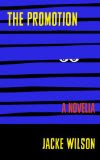 Jacke Wilson is the pen name of a writer whose books have been described as being “full of intrigue and expertly rendered deadpan comedy.” Born in Wisconsin, Jacke has since lived in Chicago, Bologna, Taiwan, Ann Arbor, Seattle, Mountain View, and New York City. Jacke now lives and works in the Washington D.C. area. He is currently doing a blog series called “The Life of Jacke in 100 Objects” which chart a biographical course from childhood through parenting. He has published two books, The Promotion and The Race.
Jacke Wilson is the pen name of a writer whose books have been described as being “full of intrigue and expertly rendered deadpan comedy.” Born in Wisconsin, Jacke has since lived in Chicago, Bologna, Taiwan, Ann Arbor, Seattle, Mountain View, and New York City. Jacke now lives and works in the Washington D.C. area. He is currently doing a blog series called “The Life of Jacke in 100 Objects” which chart a biographical course from childhood through parenting. He has published two books, The Promotion and The Race.
Please visit his blog here, especially on Monday, June 16, when he will address his writing process.
 Juan Zung is the psuedonym for Huan-Zung Hsa, aka Ghozt Writer, “small-time, local” freelance writer. Most of his projects revolve around copy-writing, copy-editing, grant-writing and blogging. He also writes short stories. “The stuff I’m working on now are sci-fi/fantasy stories. If there was a strong genre called ‘literary science fiction,’ I would very much like to be identified with it.”
Juan Zung is the psuedonym for Huan-Zung Hsa, aka Ghozt Writer, “small-time, local” freelance writer. Most of his projects revolve around copy-writing, copy-editing, grant-writing and blogging. He also writes short stories. “The stuff I’m working on now are sci-fi/fantasy stories. If there was a strong genre called ‘literary science fiction,’ I would very much like to be identified with it.”
Please visit his blog here, also especially on Monday, June 16, when he, too, will address his writing process.


June 5, 2014
Renaissance Woman
My last post was on Maya Angelou, the renaissance woman. I would like to be a renaissance woman. I have a lot of interests, and I wouldn’t mind leaving my footprint in the worlds of writing (as a novelist, memoirist, poet, playwright, screenwriter, publisher, blogger, and essayist), art (as a painter, journalistic photographer, and illustrator), food (as a cookbook writer), and humanitarianism (as an activist and fund-raiser). Oh, and fashion, just because people think I dress cool. In the end, I would like my interests and simultaneous careers to take me around the globe, in fields ranging from archaeology to astronomy (the prefect aspiration for a writer, right?).
I have an amazingly solid plan for writing my next bazillion books (actually forty-nine), which puts me at twenty novels, nine middle grades, two companions, three cookbooks, one memoir, one book of poetry, one book of short stories and plays, six non-fiction exposes, and three compilations (of other people’s works), all before 2040. If I end up in a movie or a band along the way, the better.
So now that I have had an obscure short-short documentary made about me as a small-time, cafe-showing painter, one novel published and two more due out later this year, I am about to have a short story published. (That’s right; yay!) I have had poetry published before (in Parnassus literary magazine) and an essay (in the now defunct Urban Hiker). But not since junior high have I aspired to short story extraordinaire… until now. I suppose it might be all those Sunday nights up at Francesca’s Lit Jam, but all of a sudden I am seeing shorts as a place for my ideas and efforts. Given, I’m not about to slow down on novels, but sometimes what I’m envisioning suddenly could become a poem, short story, or even–dare I say it–flash fiction.
So, (queu “I’m a Survivor” or “Firework,”) here’s to gigantic dreams, large lives, and impossible personalities.
And check out “5.8″ at Scrutiny. After all, that’s what this post is all about. Here’s a teaser:
__________
5.8
by Devon Trevarrow Flaherty
The summer stretched behind them, a long, exhausting heat and white light that shriveled the grass and the herbs and the watermelon vines. Nothing was stirring the leaves on the copious trees, and the red flag with the turquoise flower she made to welcome the summer hung limp. An intense gold light flooded in the picture window, highlighting the chinks in the wood floor, the spider webs under the edges of the cranberry couches—reappearing faster than she could daily suck them up the nozzle of the vacuum, spider and all.
Gwen reclined on the couch so that the blinding pages of Arthur reflected the sunlight, her shoulders slumped into the throw pillows heaped together at one end. Her pale eyes narrowed at the page, her top teeth biting at her sun burnt lower lip. It took several sentences of speeding text before she registered the low rumble, but then it ripped her from Camelot. She leaned up, alert and confused, with the book limp in her drooping, left hand.
Continued on Scrutiny.


June 2, 2014
Tribute to a Giant of Voice
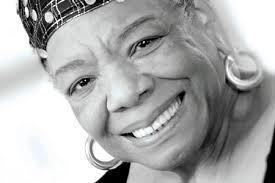 Far too quickly, I am writing yet another biographical eulogy for another literary giant. Maya Angelou died last week at age 86. She was another of my inspirations (I started out as a poet, did you know?) and her name is one even the lay-person would recognize. Not all too often does a writer gain such attention that they become recognizable, but Angelou was one of the famous writers for reasons beyond her inspiring, melodic, earthy writing: she was a true American personality.
Far too quickly, I am writing yet another biographical eulogy for another literary giant. Maya Angelou died last week at age 86. She was another of my inspirations (I started out as a poet, did you know?) and her name is one even the lay-person would recognize. Not all too often does a writer gain such attention that they become recognizable, but Angelou was one of the famous writers for reasons beyond her inspiring, melodic, earthy writing: she was a true American personality.
In fact, Angelou may best be recognized, not by her face, but by her smoky voice. In a time when recitation and reading (as a performance) is dwindling and disrespected, Angelou remained the loudest and perhaps most talented of American readers. As such, she was asked to lend her voice to events from presidential inaugurations to documentaries, and recordings of her reading her own poetry and prose are among America’s finest literary treasures.
From Saint Louis, Illinois and Stamps, Arkansas, Angelou was born Marguerite Annie Johnson on April 4th, 1928. Her life was full of interesting facts and stories, beginning in childhood and continuing to careers as everything from writer and political activist to fry cook, prostitute, and nightclub dancer. She went to school for drama and dance, but at age fourteen dropped out to become a cable car conductor in San Francisco. She gave birth to a son only weeks after high school graduation, and worked as a waitress and cook, the sole bread-winner in her family of two. In the 50s, Angelou toured Europe with Porgy & Bess, danced on TV, recorded her first album, moved to New York, and continued to act off-Broadway and playwrite. In the 60s, she lived in Cairo as a journalist, Ghana as a teacher, and the United States helping Malcolm X form his organization, and then serving as northern director for Martin Luther King Jr.’s Southern Christian Leadership Conference. She acquired various languages while abroad.
After first Malcom X’s and then King’s assassinations, Angelou began writing. Her first book–a memoir–was published in 1970, I Know Why the Caged Bird Sings and propelled her into a soaring literary career encompassing memoir, novel, and poetry. She also continued writing for film and TV. She acted, directed, and narrated, including in such works as Roots (1977), Down in the Delta (1996), and The Black Candle (2008). She served on two presidential committees, was awarded the Presidential Medal of Arts in 2000, the Lincoln Medal in 2008, has over fifty honorary degrees, and has received three Grammy Awards. She was also the Reynolds Professor of American Studies at Wake Forest University, where she taught from the 1980s up until her death. She also did about eighty performances per year on her lecture circuit, from the 1980s until the 2010s.
Her works include:
Memoir:
I Know Why the Caged Bird Sings (1970)
Gather Together in My Name (1974)
Singin’ and Swingin’ and Gettin’ Merry Like Christmas (1976)
The Heart of a Woman (1981)
All God’s Children Need Traveling Shoes (1986)
A Song Flung Up to Heaven (2002)
Mom & Me & Mom (2013)
Poetry:
Just Give Me a Cool Drink of Water ‘fore I Diiie (1971)
Oh Pray My Wings Are Gonna Fit Me Well (1975)
Shaker, Why Don’t You Sing? (1983)
Now Sheba Sings the Song (1987)
I Shall Not Be Moved (1990)
Wouldn’t Take Nothing for My Journey Now (1993)
The Complete Collected Poems of Maya Angelou (1994)
A Brave and Startling Truth (1995)
She was a literary voice. Not only is Angelou most famous for her series of memoirs (which are used throughout the world in schools and universities despite attempts to ban them), but she purposely set out to expand the idea of autobiography when she wrote them. Starting at the very outset, her memoirs are deeply personal, sometimes gritty, and always real. Because of them, she became a voice for not only herself, but for African Americans, for women, and for the oppressed. “She was respected as a spokesperson of black people and women, and her works have been considered a defense of Black culture” (Wikipedia). As for her poetry and essays, Angelou has always done well in sound bytes and bits, and her wisdom and introspection made her an oft-quoted person.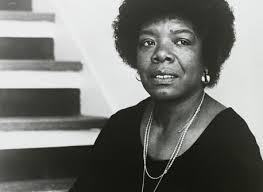
She was a strong voice amongst Americans. She was a public figure and a role model for many. We all remember Oprah’s fond attachment to her, her singing at Bill Clinton’s inauguration. And she was, as her own website proclaims her, a renaissance woman. “Dr. Angelou is a celebrated poet, memoirist, novelist, educator, dramatist, producer, actress, historian, filmmaker, and civil rights activist” (official site). There was more life and talent in her pinky than many of us have in our whole bodies. Hers was a blessed life, sometimes toiling and sometimes celebrating, spent in service to us, her beneficiaries.
_____
On a Bright Day, Next Week
by Maya Angelou
On a bright day, next week
Just before the bomb falls
Just before the world ends
Just before I die
All my tears will powder
Black in dust like ashes
Black like Buddha’s belly
Black and hot and dry
Then will mercy tumble
Falling down in godheads
Falling on the children
Falling from the sky


May 27, 2014
What’s So Free About This Speech?
This is number two of the four-part American Culture Series, in which I point out something in American culture that mystifies me, then apply it to my life (and yours) as a writer/publisher. For the first thread in the series, see What’s So Bad About Generalizations.
I had already planned to write this particular blog this morning, and then it became even more timely on my way home. You see, I heard a very short blurb on the radio about Emma Thompson (my fave!), and this blurb is precisely something which I find both peculiar and alarming about modern American culture (and getting more and more prevalent and alarming all the time). Let’s be myopic for a moment and talk just about Emma, shall we? Dear Emma said in a recent interview, and I quote, “You can’t be a great mum and keep working all the time.” Suddenly, this is world news. And Thompson is in trouble. Hmm… Can you see what I find bizarre? Because it’s not really a choice of news topics, it’s deeper than that.
I believe very strongly in free speech. So strongly, in fact, that I let other people say things I don’t believe and that I might find repulsive or be offended by. I have no desire, after they say something contrary to me or my beliefs, for revenge or for brutal, public castration. In fact, I want very badly to protect their right to say those things. (I even want, at times, to make it an event for open discussion and for exploration of ideas. Sometimes, I sigh and roll my eyes.) Alas, public opinion has become the judge and jury for people with power. From chefs to actors, from sports team owners to sports stars, one by one the most recent buzz is taken as occasion to villify and massacre (usually through their career) those who share an opinion outside current fads and to (less often) glorify those who share opinions within the media trends.
Let’s go back to Thompson. I love Ella. I have loved her for a very long time… as an actress. She is, recall, an actress. And let’s take a further look at what she has said. “You can’t be a great mum and keep working all the time.” First off, this statement is definitional in nature. Clearly, you can not do anything while doing something else all the time. Second, this statement is inherently vague. Seriously, parse it out. Third, the interview was clearly an opinion piece, where she mused in a broad sense on her year “off” (during which she taught, by the way). Fourth, it was a very light piece, in which she spoke at times with tongue in cheek, and always, always, always came back around to her own experience. She even mentioned, “…if they can afford it.” Fifth, she’s a working mom! Has been a working mom for a long time, and has worked very hard for much of it. Sixth, for kicks, let’s turn the statement on it’s head and see if it would fly: “I, Emma Thompson, think that all stay-at-home moms should spend a little time working so they’ll know what that’s like.” Um… Call the front page! Emma is way cool! Oh yeah, and seventh, she’s an actress.
All that aside, she’s allowed to say that. I would even encourage her to say it, except that she might get publicly crucified for it.
As you might already be able to tell, the whole killing the messenger syndrome has got me quite frightened, as a writer and a publisher. Pretty sure you can see why. I don’t have delusions of fame as solid as Thompson’s (ahem, not that I would admit to you, anyhow), but I am very much invested in the need for a large range of free speech. Writers step on toes! They’re supposed to! And God help us if we actually get a call from Oprah! And she asks about immigration/gay marriage/Christianity/reproductive rights/working moms/racial tension/child-rearing (or whatever other issue has nothing to do with your job but could get you in big trouble for merely stating an opinion)! Or if, in that interview with Oprah, we just blurt out some loosely-held, half-cooked opinion in our subtext, like “Ridiculously famous, gorgeous and wealthy acting moms have bad days, too.”
Let’s break it down into my arguments for the Thompson statement. First, half the time what was said wasn’t that shocking or exciting to begin with. It’s just the buzz that makes it so. Second, I think that a lot of the time, people aren’t spouting some sort of deeply-entrenched, get-on-the-bandwagon, political ideology. They are just talking, working life out for themselves. Third, no one shares all of your opinions, or all of the cool, PC opinions. And that’s not only okay, it’s great! What is this? Some sort of mass-codependency issue? Fourth, context, context, context. So much of what passes for shocking statements these days is merely something ripped from its context. Think rest of the interview, think time, think place, think society… just think. Fifth, if one were to understand this person, would another, more nuanced story emerge? We are a culture of flash judgement–flash everything, that is for sure. Sixth, I find you can often turn the opinion over (into the negative) and discover one that would not be condemned. This tells me that freedom of speech is being undermined, and not something else (at least fundamentally). This further communicates to me that I should not exercise my freedom of speech because my culture has a bad habit of undermining, devaluing, and even using it against people. Seventh, I know that we remind famous people that they are role models all the time, but this is no way gives us the right to a smear campaign when their lives or words don’t match our ideals. They aren’t responsible for raising our kids or making our judicial decisions; they are responsible to the law (mostly, like, not hurting other people), and they are responsible for entertaining us (or challenging or inspiring, or however it is they get paid).*
And let me just throw eighth out there: sometimes what is said has been said in private. In that case: shame on you for thinking that’s our business. What happened to privacy? You want it. You need it. So extend this right to others, please.
Now, I’m going to break it down, as a writer. First, you don’t really have to even be all that off-base to start a downward spiral of public opinion. That means that we’re becoming–if we notice the trend–less confident as a profession. There’s no safety in benign writing, anymore. But who wants to spend their writing career being completely inoffensive? Let’s move on. Second, we are in a dangerous position, because even fiction can become fact in the current climate. I may personally oppose the opinions of my main character, but in the buzz that may not matter. Third, there are no universally held opinions, and there is no way to remain neutral as a writer. You are in danger. Fear for your career. But you might as well be bold, man! Fourth, at least writers have the ability to keep fictionalized opinions in context… until they’re not. Fifth, I do believe that the more people we can keep reading, the more we can help people to see actions or people in context and as complicated beings. Write nuanced fiction. Sixth, it will take braver and braver people to be in the public arena (as a writer is), just like in cultures where freedom of speech is officially limited. Seventh, we do have responsibilities to our society, as under the law. Okay. We also have a responsibility to entertain, challenge, and inspire, and hopefully those who do it more will get rewarded more and those who do it less will fall off. This is a strange, new world of publishing, PODs, selfies, indies, crowd-funding, and the like. Our industry has only just begun to settle, let alone deal with the demands of an increasingly caustic and decisive public opinion arena. Perhaps it will help if we keep our specific themes and issues clear and remind ourselves and others that generally, we are just human.
This is why we oppose the banning of books! This is why people in other countries fight and die for free media! This is why freedom of speech is a basic right of our democracy! Side-stepping the legal process in favor of viral-public trial is a thwarting of our basic rights. Writers, keep writing! Dodge the bullets of negative publicity and persist! And perhaps we can shine a light on the problem itself; that’s something we’re good at, at our best.
I’m skeptical. I’m going to have to keep my eyes and ears open. I’m going to have to consider the possibility of becoming a hermit writer. And I am going to continue to side with the people who say uncool, stupid, and sometimes even terrible things, because they can, and because I want to be free, too.
_____
Have you noticed this trend? Do you think it’s real? Does it threaten you as a writer, and how or how not?
____________________
*Generally, society rewards those who uphold our standards, but that’s not even always true.
So let’s discuss means, while we’re on the subject. How does society properly reward or punish a person? Is it even in their scope? And should it be? Certainly, we do it, but it’s not organized in the sense that it is not a democracy. The punishment and rewards come from ambiguous, localized sources of power disseminated through the public and have no real restricting body except for this: they are not supposed to be slandering or usurping basic rights and freedoms or physically harming anyone. Criminality is supposed to be directed to the law. And then there is no way to uphold this when there is no one person perpetrating it. It is all of us. Throw the handcuffs on every Twitter-bug out there, every Facebook fanatic, for “like”ing the demise of a powerful person and contributing to their slander and infringement of rights. How did they do it? Protests and bans aside, this is no longer peaceful. We call for jobs! We call for unseating! We call for public humiliation! And protests and bans inside, we call for financial crippling, but long before we’ve thought it through, long before we’ve put ourselves in someone else’s shoes.


May 22, 2014
What’s So Bad About Generalizations?
Let’s call this the American Culture Series. It will be four parts, posed in the title as questions, and each one will address something that as a philosopher I find strange about American culture. Then I will explore it from the perspective of my job (and obsession) as a writer and publisher. And now we’ll dive right in.
I find it weird that we can get in trouble in modern America for making generalizations.*
As a writer, I use generalizations every day. I find them extremely important for my job, and I bet you do too. But these days, I find my ability and my right to make generalizations greatly impeded when individual Americans increasingly assert their right to shout a contradictory opinion, lifestyle, or example at me. It’s not the opinion, lifestyle, or example that’s the problem, it’s the venom thrown at people for making generalizations. Here’s the thing about generalizations: They’re okay. They’re functional, practical, and even necessary. They’re a tool, which we can use in positive ways to make sense of the world, set expectations, and move forward (and, yes, can use in negative ways, too, but they are just the tool). They’re not the end-all be-all, but they are part of a healthy life and society. So, someone called me a boy because my hair was short. (This used to happen to me all the time.) I correct them, I move on. Next time they have a broader scope, but I can’t blame them for using a nearly universal hair cut to judge me a boy. And I certainly don’t have to let it define me, just as they don’t have to let one example throw off their whole perception of male and female haircuts. Still, generally, men have shorter hair, women have longer hair. It’s called a “generalization” and not an “absolute” because there are always outliers, always exceptions. Just as, in the future, that generalization may turn on its head and become the opposite: generalizations are fluid.
Just write something. An essay or opinion piece, a blog. And then evaluate each sentence for generalizations. It’s replete, isn’t it? That’s cuz it’s a survival skill, one that is adapted right into our system to help us make sense of our world.
In writing, we need to be able to make generalizations so that we can speak to the audience that we intend to. If my novel is meant most specifically for Middle Grades, it’s really best to keep the language clean and not strongly consider that less-than-one-per-cent of seventh graders whose parents believe they should have early exposure to the f-bomb. I’m not a bad person, or even a bad writer, for writing children who are healthy and innocent, girls who like princesses and ponies, or small towns that have tracks with two sides. Sure, it’s great to jump up and surprise (aka. wake up) your reader every now and again, but both the surprises and the satire (or cliches) are ways to challenge the reader with your writing. You can’t accomplish anything if you’ve already lost them from pure contrariness. What rings truest to readers is a combination of like 90 per cent what is expected and 10 per cent the wow factor. Even with characters, the best of them are mostly what we recognize with a good dose of the unexpected.
In designing books, we need to be able to make generalizations so that a significant amount of people will pick up our books (both physically and virtually) and fork out money to take them home. And also enjoy them and be effortlessly immersed in them. This is why getting professionals on board is so important; they know what the general public likes and they can (if they’re any good) hit that nail on the head. What is the current industry standard? What speaks to middle aged women in the twenty-first century? What quality and qualities are people expecting from a mystery novel, these days? Sure, Bob Sherborne in Topeka, Kansas really loves holographic covers, but most everyone else is tuned into and expecting the retro 80s style. (I just completely made that up, by the way. Please don’t make your mystery cover 80s-style based on my erroneous example. And don’t go looking for Bob with your holographic PI; he doesn’t exist.)
In marketing, we need to be able to make generalizations so that we can build an audience and sell that book. Marketing is replete with generalizations. You should do A because people like A, because A makes them feel safe, or happy, or affirmed, because people will identify with A, will buy A, will remember A. Okey doke. Then we’ll do it. But what about Cindy Lou Who?! She won’t buy it! In fact it will bring up horrible childhood memories of an incident with a roast beast! Sorry, Cindy Lou. Maybe you should get counseling.
There are times when we mean to reach out to counter-cultures, and that’s when we write, design, and market niche fiction. There are times when we mean to expose the general public to a counter-culture. That’s when we write, design, and market for generalizations and then slip in that ten per cent of challenging material.
In publishing, we need to be able to make generalizations to function at the computer and in the industry. We subscribe to magazines that give us sweeping swaths of what’s up in publishing, what’s up in the writing world. We take that info, we churn it around in our little brains, and then we do what we deem best. When I’m deciding between self- and traditional publishing, for example, I don’t want to consider that one person who did it the other way and succeeded (although this is very tempting), I want to know how the majority of people succeeded. Then, when my computer glitches while I am uploading a PDF, I need to start first with the most common solution to that Microsoft problem, not with what one dude in Portugal did that worked only for him.
And in all the little ways, we need to be free to generalize so that we can pick the best equipment and tools, can make a large, solid platform, and can identify with our reader.
One of the reasons I think I make a good writer is that I have great (but far from infallible) cultural discernment. This is important to writers because writers need to 1) use the culture to connect to the reader, then 2) connect the reader to their culture, then 3) expose the culture to the reader. This is one of the most powerful and important aspects of writing (and art). Writers help define and change culture with this amazing power to clarify, expose, and enlighten. (Clearly, I’ve never bought into the passive writer idea, or the “I just write to write” thing.) By blasting writers (and other people) for making generalizations, we are taking from them one of their greatest tools to effect change and betterment, and ironically, cutting off at the knees their ability to further the cause of the disenfranchised, the minority, the weak, the outliers.
In conclusion, generalizations are not the same thing as persecution, and they are only “judging” in the most basic sense. We need them in our lives, we need them in our society, we need them to work. So let’s stop attacking generalizations (and give people a break) and deal with what really matters to us as an individualist society: basic freedoms, the pursuit of happiness, and equality. So it’s not about the generalization at all. Generalizing is a tool, and we can use it for good or for bad. Let’s not villainize the tool, let’s wield it properly, responsibly, for the general good.
____________________
*Let’s start at the beginning. For much of human history–really almost all of it–humans were (and are) a communal animal. Now, we can take that fact for granted, but let me just skip to the punch line here; as an individualistic society–perhaps the most individualistic society in history–we can not appreciate what that even means, let alone how it really functions or why it might be a good thing. Being communal versus individualistic involves a different basic mindset about a person in relation to those around them, and our mindsets are completely different from most of the world on this one. Of course, we are slowly infecting the rest of the world with our assertive individuality… which is maybe why it’s good to explore this concept now.
But I’ll leave you with those thoughts and concentrate on one aspect of it. In America, it has grown increasingly faux pas to make generalizations. Even today, many of you will be either frustrated at someone else for making a generalization or will berate someone else for doing it. So what’s so wrong with making generalizations?
In our collective mindset, it is bad to make generalizations because 1) we assert the importance and autonomy of every member of our society, 2) we want each and every voice to be heard, every opinion to count, 3) we like justice to work even to the smallest of cases, the most concentrated of circumstances, and 4) we love to be validated and hate to be ignored.
Generalizations are, at their most basic, a survival tool. They are necessary for everything from law to scientific advances to marketing to medicine. Without a history of generalizations, we couldn’t have advanced to where we are as a species. Without generalizations, we couldn’t make it through the day. What do I mean by that? It is our instinct to base current decisions on our empirical history: what we experience, our mind turns into categories and generalizations that we can work with: while driving a car, while getting ready for work, while making dinner. Where would science and social science be without generalizations? There is a point in every experiment or trial where we say, “Enough is enough. A standard has been met. This population behaves this way.” Then, the needs and desires of the larger number are met. Quite utilitarian.
At best, a communal society does a better job at taking care of its outliers, like the widowed and orphaned and elderly. It can embrace traditions as an important part of life. It remains static, or stable, predictable and secure, and is not always changing with the newest thing. It can have less crime, less vice, less loneliness, less stress, and more connection and support.
At its worst, a communal society can devolve into mobs, can commit great crimes and even genocides through a sheep mentality. The “crowd principle” would seem to thrive in a communal society. It can harbor restrictive laws, unhappy people, and a lack of equality and rights which can lead to slavery and other hierarchies and class systems. (Of course, you have to remember, you read all those paragraphs through an individualistic lens.)
Perhaps the best solution, then, is a mixture of the individual with the community, and a mix of functional generalizations with a compassion and understanding of exceptions.


May 19, 2014
Viral Posts and “Duck Tales”
Sometimes I wander Facebook and click on a share and wham! I am treated to something really cool. Other times, the ending is far less exciting, and I raise my eyebrows at a virtual wonder that has gone viral, but is total poo. A week ago, I stumbled upon something that was really neither, just slightly entertaining, and it made me smirk but not quite through the whole thing. On this particular journey into the viral side of the internet, the mediocre post got me thinking about attention-seeking on the web and how virality is accomplished. Here are my thoughts.
The secret ingredients (when they even apply) seem to be talent plus something immediately appealing. So maybe you should determine first where your real talent lies–the more dramatic and outstanding, the better–and then twist it together with something immediate, something to catch the viewer right now (making sure production is also dripping with talent). That can be something relevant (trending), it can be something eye-popping (in a short phrase or a still photo), and/or it could be something else, like nostalgic or edgy, or popular. And you can appeal to various instincts in people, just go for the broadest; horror, romance, disgust, amazement, curiosity…
Another part of the equation is to pick something that makes a connection to the viewer, the person behind the device. You can pull this out of their past, their present, or some hope or fear for the future. Of course, if you want to go viral, we’re talking universality here. We all have pretty similar hurts, habits, hang-ups, dreams, aspirations, cultural memories, etc.
Now here’s an important one: they can’t say no. When you whip something out onto the internet, what you have presented is in competition with an impossible amount of other stuff. So should someone trip across it, they CAN NOT say no. It has to be that compelling, that tempting, that interesting.
Haha, good luck. While a huge part of me thinks that if I sat down with a group of smart people, I could come up with the prefect viral idea and then use more really talented people to implement it. It’s just a matter of time and talent, right? Wrong! Like everything else in life–especially the modern life–it’s largely a matter of luck. Go ahead, it’s best for you if you line up all your ducks and study all the best practices, but there is absolutely no guarantee–in fact, not much of a chance–that you will go viral. In the writing world, we are often referring to this most discouraging of principles (it’s the same in publishing), so our reaction to it has been to tell authors to keep producing. (In other words, keep playing your cards and perhaps one day you’ll get a royal flush.)
Going viral almost always results in a quick peak and then a fizzle to nothing. So don’t make going viral a primary goal of yours if your long-term goal is to stay visible as an author or artist. I suppose that occasionally virality results in a flurry of sales and reads and follows, which then results, in the future, in more reviews and shares and more sales and reads. The problem is, attention in America (and spreading outward) is very short, and there is too much vying for that attention. So keep publishing, blogging, tweeting, Facebooking, pinning, making book trailers, etc., but don’t change what you’re doing to appeal to the fickle, general public. Target your readers.
Don’t beg. I don’t know, plenty of people seem to click on posts that ask them to share, but I don’t. If it says “Share me!”, I hardly ever even look at it.
Make yourself visible. So you’ve gone viral. It happened so fast, you hardly even knew it before you hit 1,000,000. What now? You better be darn sure people can find you (like already, before virality happened), and ways to purchase books (or art or whatever) should always be visible and easy. Now, your blog might not be linked in that HuffPost article, but when someone in India Googles “Devon Trevarrow Flaherty” or “awesomest book trailer ever,” you want all lines possible to lead back to you. Money is king, right? You want this to translate to sales, either immediately or down the road. Don’t feel dirty about it; this is your job, so you have to get paid for it or stop doing it (unless you are independently wealthy. If you are independently wealthy, stop all attempts at virality and contact a major network about a reality show.)
And, just for kicks, here are some of my favorite viral posts:
 Duck Tales Rythm and Blues – This is the one that got me thinking. It’s fairly cool.
Duck Tales Rythm and Blues – This is the one that got me thinking. It’s fairly cool.
 Gymnast Routine with Ball – This is the one I would use as an example, even though it hasn’t gone crazy viral, probably b/c it has no production slickness.
Gymnast Routine with Ball – This is the one I would use as an example, even though it hasn’t gone crazy viral, probably b/c it has no production slickness.
 Photos of Famous Places from New Angles – This is the most recent one I have really enjoyed.
Photos of Famous Places from New Angles – This is the most recent one I have really enjoyed.
 Sidewalk Art – One of the first Facebook share clicks I ever really loved.
Sidewalk Art – One of the first Facebook share clicks I ever really loved.
 Shadow Art from Junk – The last one reminded me of this one. Maybe we could contact the artist and see if all the online attention has changed his life?
Shadow Art from Junk – The last one reminded me of this one. Maybe we could contact the artist and see if all the online attention has changed his life?
 The Crowd Principle, or Something Like It – An example of social issues and virality. Does it help? Are there more people stopping to help downed people? No idea, but I’m gonna guess not too many.
The Crowd Principle, or Something Like It – An example of social issues and virality. Does it help? Are there more people stopping to help downed people? No idea, but I’m gonna guess not too many.
 Scariest Trail in the World – Maybe it’s the adventurer in me, but I always remember this one.
Scariest Trail in the World – Maybe it’s the adventurer in me, but I always remember this one.
 What Does the Fox Say? - And one that followed all the principles I can think of, and actually worked. Of course, music talent is one of the most amenable to the internet and transfer to purchases, but this has turned out VERY well for Ylvis, which is fun because he is clearly very talented.
What Does the Fox Say? - And one that followed all the principles I can think of, and actually worked. Of course, music talent is one of the most amenable to the internet and transfer to purchases, but this has turned out VERY well for Ylvis, which is fun because he is clearly very talented.


May 12, 2014
Tribute to a Magical Realism Giant
 Gabriel Garcia Marquez, literary giant, died almost one month ago. Known affectionately as “Gado,” Marquez was first made internationally famous by his magic realism novel, One hundred years of solitude, and it remained his most famous and revered (a classic of the twentieth century), along with Love in the Time of Cholera. He won the Nobel Prize for Literature in 1982 as well as the Neustadt International Prize in 1958. He is also known for popularizing magic realism as a writing style, and hardly a conversation can be had about it without mentioning Marquez.
Gabriel Garcia Marquez, literary giant, died almost one month ago. Known affectionately as “Gado,” Marquez was first made internationally famous by his magic realism novel, One hundred years of solitude, and it remained his most famous and revered (a classic of the twentieth century), along with Love in the Time of Cholera. He won the Nobel Prize for Literature in 1982 as well as the Neustadt International Prize in 1958. He is also known for popularizing magic realism as a writing style, and hardly a conversation can be had about it without mentioning Marquez.
Marquez also happens to be one of my writing inspirations, and One hundred years of solitude is one of my all-time favorite books. His work began the Latin American literature boom (for which I am also grateful), and he was an integral figure in both literature and politics. His stories are heavily influenced by his life and real places, events, and people. His main themes include reality, dreams, love, solitude, and the period of violent unrest in Colombia known as La violencia. Interestingly, while Marquez is known for magic realism–the deliberately impassive inclusion of miraculous events–his writing is also known as searing, spot-on realism.
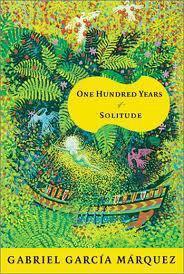 Marquez was born Gabriel José de la Concordia García Márquez in Aracataca, Columbia (the inspiration for his fictional Macondo), in 1927. He was raised by his grandparents (a retired colonel and a storyteller who related unnatural events to the child-Marquez in a purposeful dead-pan) and then by his mother and father, a pharmacist. Throughout the 50s, he was a lauded journalist for various papers. Into the 60s, Marquez married his college girlfriend, Mercedes Barcha, moved to Mexico City, and had two sons, Rodrigo and Gonzalo. During all this time, Marquez was also establishing himself as a a writer of short stories, novels, and eipcs. He would later also turn to screen-writing and film criticism.
Marquez was born Gabriel José de la Concordia García Márquez in Aracataca, Columbia (the inspiration for his fictional Macondo), in 1927. He was raised by his grandparents (a retired colonel and a storyteller who related unnatural events to the child-Marquez in a purposeful dead-pan) and then by his mother and father, a pharmacist. Throughout the 50s, he was a lauded journalist for various papers. Into the 60s, Marquez married his college girlfriend, Mercedes Barcha, moved to Mexico City, and had two sons, Rodrigo and Gonzalo. During all this time, Marquez was also establishing himself as a a writer of short stories, novels, and eipcs. He would later also turn to screen-writing and film criticism.
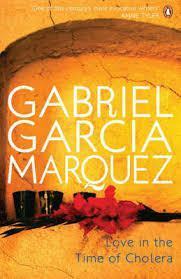 Leaf Storm, Marquez’s first novella, was published in 1957, after looking for a publisher for seven years. Then, Marquez was struck by sudden inspiration to write an epic novel about his childhood with his grandparents. After writing every day for 18 months, he had $12,000 in debt and A hundred years of solitude, which became his greatest commercial and critical success, despite his constant dismissiveness (and even rancor). His fame led him to move to Spain, deeper into politics, and to famous and tumultuous friendships. Afterwards, he spent a lifetime (mostly in Mexico City) writing and publishing his books: No One Writes to the Colonel, The Evil Hour, The Autumn of the Patriarch, Chronicle of a Death Foretold, The General in His Labyrinth, Of Love and Other Demons, and Memories of My Melancholy Whores. His works also include compilations of short stories and nonfiction books. He published a memoir (which was part of a trilogy that was never continued), Living to Tell the Tale.
Leaf Storm, Marquez’s first novella, was published in 1957, after looking for a publisher for seven years. Then, Marquez was struck by sudden inspiration to write an epic novel about his childhood with his grandparents. After writing every day for 18 months, he had $12,000 in debt and A hundred years of solitude, which became his greatest commercial and critical success, despite his constant dismissiveness (and even rancor). His fame led him to move to Spain, deeper into politics, and to famous and tumultuous friendships. Afterwards, he spent a lifetime (mostly in Mexico City) writing and publishing his books: No One Writes to the Colonel, The Evil Hour, The Autumn of the Patriarch, Chronicle of a Death Foretold, The General in His Labyrinth, Of Love and Other Demons, and Memories of My Melancholy Whores. His works also include compilations of short stories and nonfiction books. He published a memoir (which was part of a trilogy that was never continued), Living to Tell the Tale.
In his late life he struggled with lymphatic cancer and then dementia, and died of pneumonia at age 87, with incomplete projects.


May 8, 2014
Happy 600!
One of things about this brave new world of modern publishing is that we are always learning: learning from each other; learning from our mistakes; learning from the things we have done right.
I accidentally did something right in the social media/publicity department the other day. Now you can learn one little thing from me.
However, before I go there, I want to share a small piece of my mind. I agree with those in modern publishing who say that you should not overuse your real friends or overtax your fans. In other words, no hounding, no nagging, no spammy-type bombs, and minimal mixing personal with professional life. Yeah, my friends and family want to know when my new book hits the shelf and when I get interviewed by the New York Times. They don’t necessarily want to know every time I post a blog or update my book cover. Constant promotion of yourself to your friends and family is going to get you un-followed, un-liked, blocked, excommunicated. Likewise, being obnoxious to your followers and fans is going to result in a loss in numbers, not an increase. In other words, if you are a professional, act like it. And always, always, always be classy about it. For Pete’s sake.
And other thing: if you are an author or other type of artist and don’t know the head from the butt of social media, I strongly suggest you get proficient at it, even if it is only one or two platforms. I have never truly understood or excelled at Twitter. On the other hand, I have blogging down, do pretty well with Facebook and GoodReads, and am likely going to branch out into an author Pinterest page. Sure, it’s true that the more social media you cover, the broader your base will be. But I imagine that each new media comes with diminishing returns, and you only have so many hours in the day and so many things you can be good at or enjoy (or tolerate, even) doing. Plus, each media you enter needs to be kept up. Like a garden, you will need to feed into it at least weekly, keep it professional and up to date, etc. It is going to get increasingly difficult for most authors to market their books without using these avenues of publicity. As they say, build your platform. This particular blog entry is about Facebook.
That said, I will occasionally communicate with my real friends about my professional life, even on social media. It had been a long time… months, at least… since I had said anything professional on my personal Facebook. So when I broke 600 on The Starving Artist, I noticed that my Author Facebook Fan Page had never broken that 100 Like barrier. So with a publication coming this fall and another in the winter, I decided–in honor of the 600 followers mile-marker–it was about time I got my own Facebook domain name (which you get by hitting 100 Likes). Therefore, I went to my personal page, and did a status asking friends who wanted to get updates in their feed to Like my Fan Page.
Ehn. It went alright. I hadn’t had like a bazillion statuses or lots of interactions on Facebook lately, so few people even saw the request. I thought of “Promoting” it, which means spending something like $7 to have it pop to the top of friends’ feeds. But I tried that last year, and it was not very impressive, at all. Definitely not worth seven bucks.
That evening, on a fluke, I decided to Invite friends to Like Devon Trevarrow Flaherty’s Facebook page. I did it as me, the personal Devon. I started clicking on each person I wanted to invite as I went down my line of a few hundred friends. I admit, I felt a little guilty, because I don’t love it when people Invite me to play games I’ve never heard of, or whatever. But after I hit about the tenth Invite and realized that there was already another two Likes on the Fan Page, I started talking myself into it: obviously, people would see that they had an invitation from me, it was almost unignorable; I hadn’t done anything like it in awhile, actually I had never done any invites; of course, this was as important to me as someone else’s house party or playing out at the local bar; and, as the numbers mounted ridiculously fast, I knew it was working. Well.
So that’s what I learned. Don’t status it. Don’t promote it. Invite it. But make it special: only do it when it’s very important, few and far between. I won’t be using it again until the book launch in the fall. And you can bet that this advice will change in about thirty seconds, due to the speed of technology. But then there’s an underlying lesson (and without breaking the cardinal rules of best practices): if it ain’t working, try something else.


May 5, 2014
Book Review: Who Could That Be at This Hour?
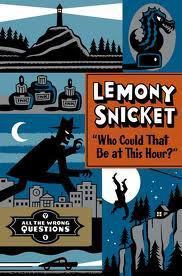 Who Could That Be at This Hour?, the first book in Lemony Snicket’s four-part All the Wrong Questions series which acts as the prequel for the A Series of Unfortunate Events series. Published 2012 by Little, Brown and Company and illustrated by Seth.
Who Could That Be at This Hour?, the first book in Lemony Snicket’s four-part All the Wrong Questions series which acts as the prequel for the A Series of Unfortunate Events series. Published 2012 by Little, Brown and Company and illustrated by Seth.
Normally, I would wait until I had read all the books in a series before reviewing, but since the last books aren’t yet published, I figured I would slot All the Wrong Questions and A Series of Unfortunate Events for later in my TBR. Then, I realized I didn’t want to wait to review it, altogether. So, here it is. Just the first book.
It wasn’t on the list of Best Books, but was something I bought for my kids based on general bookstore and library recommendations. It didn’t go well. Although a short read, the kids were a combination of confused and bored. But I wasn’t confused or bored, so once they wrapped it up–between me and Kevin–I picked it back up to give it a more grown-up read. And, as I suspected, I loved it.
Why the rift, then? At first, I thought Snicket had just really missed the mark, by writing an adult book and calling it middle grades because of the length of book and age of the main character. But then I noticed something somewhere on the internet and I thought I was way over-thinking this. It’s a YA book. Which means, it would be normal for my kids to find it over-their-heads and dull, and normal for me to like it even so. But then, I returned to the book and realized I wasn’t over-thinking it after all. Sorry, Snicket, but it looks like a kids’ book. The illustrations and cover, the large writing and giant margins, the cutesy back cover copy. In fact, all Snicket’s stuff hits me that way. Which is why, maybe, there is a sort of tension about the Unfortunate Events series. You want to hand them to an eight-year-old, but then you really don’t. You want to tell a teen they might enjoy it, but then you’re afraid they might get made fun of.
The truth is, the writing is clever, subtle, and high on the vocabulary scale. It’s also fast-paced, plot-driven, and–subject-wise–kid-friendly. And underneath it all, it has this sort of young spirit-old soul thing going on. The time and place, in fact the general tone, makes more sense the older you are. But it’s meant to relate to younger people. It feels like he could have combined all four into one book (especially since the ending is almost too cliff-hanger for its own good), made the type smaller, and beefed up the cover. I don’t know what to conclude here. I just know the series has some identity issues.
But we’re back to this: it’s good and it’s enjoyable. I want to know whodunnit. I am ready to read the next one. I love the imagination, here. I love the setting, the tone, the characters, Snicket’s playful use of language. Yes, yes, yes, I would recommend it, but not for young kids and not if you will be offended by the simplicity and the youthfulness behind it. In fact, I really recommend it. My kids? Not yet.


May 1, 2014
Goodbye, Camp NaNoWriMo
Yeah, that’s right. I “won” Camp NaNoWriMo. That means I wrote 50,000 words during the month of April, toward a brand-new novel. I am on Chapter Seventeen: Trades and Deals, of approximately twenty-seven, which means I am 50,187 words into approximately 70,000-80,000. As a note, I also managed to write more than 15,000 words in the last three days of Camp.
Why do I do NaNoWriMo? Two reasons. First, I have 50,000 more words than I would have had otherwise. Sometimes, like last November, that means I have a whole book that didn’t exist before. Big bonus. Second, I consider it a learning experience. So, what did I learn this time around?

1. I can do it. I have only participated in NaNoWriMo once before, November of 2013, and due to a physical injury (and possibly other things), I was unable to write much more than 30,000 words. (For my failing adventures in NaNoWriMo, see here.) Before I tried it the first time, I did not think I was capable of writing 50,000 words in a month. Now, I am sure that I can. In fact, I am convinced I could write even more, if the need arose.
2. I can do it even though… It wasn’t like an easy month, where I sat in an isolated cabin in the woods and had Chinese delivery every night. Here; let’s evaluate my productivity graph (one bar for each day of the month):
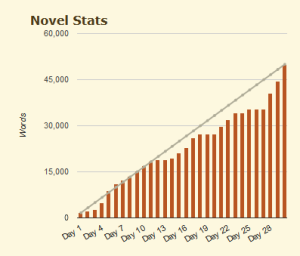 See the first lull? That’s just a bad start. Then it’s all good, right? The next lull: that’s a two-day migraine. The next? Easter weekend. Then that last big one? Me telling myself I’ll just take it easy for a few days and hit it real hard at the end. That was basically dumb. Also note, I am a carpool mom, the chef around here, the laundress, the housekeeper, and am active outside of the home. My kids had school projects that needed assistance, I was in a fender-bender, my dad came to town, there was a false claim made against my car insurance, a tornado warning, allergies… Which just tells me, in the words of a friend of mine, I’m a champion. Because this wasn’t easy. It took sacrifice and determination and sacrifice and grit and sacrifice and mental stamina. Champion of the world.
See the first lull? That’s just a bad start. Then it’s all good, right? The next lull: that’s a two-day migraine. The next? Easter weekend. Then that last big one? Me telling myself I’ll just take it easy for a few days and hit it real hard at the end. That was basically dumb. Also note, I am a carpool mom, the chef around here, the laundress, the housekeeper, and am active outside of the home. My kids had school projects that needed assistance, I was in a fender-bender, my dad came to town, there was a false claim made against my car insurance, a tornado warning, allergies… Which just tells me, in the words of a friend of mine, I’m a champion. Because this wasn’t easy. It took sacrifice and determination and sacrifice and grit and sacrifice and mental stamina. Champion of the world.
3. I can pull it out at the end. I really hate having to do things this way, but let’s face it, it’s not uncommon for me or anybody else. When the pressure’s on, the gloves come off.
4. I can grow as a writer. I have never written more than around 3,000 words in a day. Thanks to suggestions from fellow campers that some people write a novel in a weekend, averaging more than 10, 15, even 20,000 words per day I smashed that record with a 4,000 word day early in the month. Then I did it again when I hit well over 5,000 on the last day. And, of course, word count isn’t everything. I wrote some pretty great things partly because I approached this Camp as an experiment in the Hero’s Journey. It was out of my comfort zone to write straight-forward fantasy with a fairly care-worn plot, but I believe it strengthened me. I needed stretching in the plot and pacing department.
5. Books can be saved. I guess I always believed this, but took some time this month to solidify this idea. Many writers (not all, but many) just write the first draft. They don’t plan everything out. They don’t dally. They don’t backspace almost as much as they type forward. They don’t re-read everything as they go, making corrections. Generally, I do all those things. But this other philosophy–that once the words are on the page they can be manipulated into something great–is kind of part of my life philosophy. Anything can be redeemed. In this case, it just takes a smart author and a great editor and some time and patience.
6. Perhaps I can make brilliant books without demanding too much of my reader. I forced myself to do two very specific things during Camp: write linearly, and use first person from one perspective only. Oh my! If you have read anything of mine, including the other two books that should be published this September and coming January, I am anything but a linear, one-perspective writer. The Family Elephant’s Jewels is broken down into eight sections which each tell the story from another sibling’s perspective. Benevolent was so riddled with flashbacks that it got labeled a “tapestry.” The Night of One Hundred Thieves has around forty point-of-view characters.
Sometimes, doing exactly what you don’t normally do is the best thing for you. It lets you explore whether those other ways of doing things aren’t actually better. In this case, The Journey of Clement Fancywater will demand less from the reader and open my voice up to other audiences. I was afraid I would lose my voice if I changed perspective. In fact, experimentation will most likely strengthen it, over time, and through experience.
I know later I am going to kick myself for having forgotten to tell you about some other great lesson I learned during Camp. But let’s just say that I have laundry, dishes, and a usurping ant colony to deal with, and I desperately need to catch that bus out of camp and wave through the dust as I leave it behind. Till next year.





